Later this year, Prishtina’s current mayor, Shpend Ahmeti, will run for another term as Vetevendosje’s candidate in the mayoral election. The 39-year-old’s past four years have not exactly been a bed of roses. The fierce political battles between him and representatives from LDK and PDK in the Municipal Assembly, and the fight to change the face of the capital city have taken a toll, rapidly turning his black hair grey.
Despite the challenges, the former professor of public policy is ready to enter into another phase of transformation for Prishtina. Ahmeti wants to move out of what he calls a transitional period, and go from providing the city with basic needs, such as water and public transportation, into creating a city that will be more liveable and attractive to tourists. Ahmeti is already looking into the future, and his ambitions do not end with re-election as mayor for another four-year term.
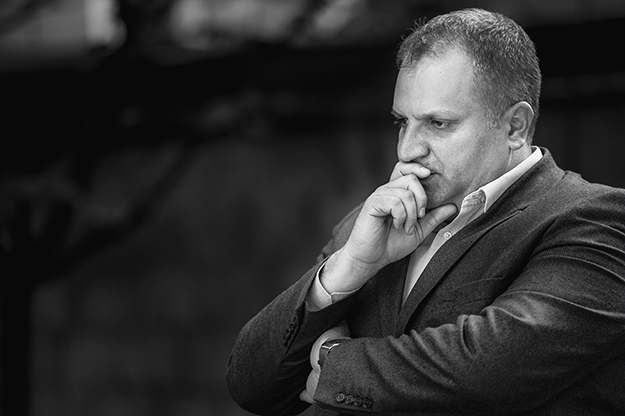
Photo: Majlinda Hoxha / K2.0.
The incumbent mayor strongly believes that this year’s election will see Vetevendosje gain a lot more support in Prishtina’s Municipal Assembly, where he complains his projects have frequently been blocked, and where there has often been harsh words exchanged with rivals from LDK and PDK. He concedes that compromise in politics is unavoidable, but that representatives from the LDK-PDK coalition have challenged his principles, making compromise difficult.
In this wide-ranging interview with K2.0 in this crucial year for him, Ahmeti discusses striving for equality while offering the private sector the space for business, and justifies the radical steps he has taken to help improve Prishtina.
K2.0: In many of your public appearances, I’ve heard you say that being the mayor of Prishtina has been tiring, and that you could have earned much more doing other things. However, you have already been announced as Vetevendosje’s candidate for one more mandate. What motivates you to run for another term, if the past four years have been so draining?
Shpend Ahmeti: One shouldn’t believe any politician who says that he has sacrificed a lot and that he could be in a better place financially. The material is substituted by the spiritual. In financial terms, I might have been in a better position. In fact, it is just now that I realize this, but I do not want to victimize myself. One cannot say: ‘I have sacrificed myself.’ No, we sacrificed nothing. We chose this path ourselves, and I chose this service. I’ve spent all my life serving the public. I worked in civil society, I taught, and now I am the mayor. These things give me satisfaction.
And what have the satisfactions been over the past four years?
It is the proof that in Kosovo things can be done differently. When you can show someone that politics is not bad by default, and that a politician can work for the welfare of the people. Did we make mistakes? Of course, it is impossible without mistakes. Could we have done more? I believe that we can always do more. But in general, there has been an ongoing battle as to whether things can be done differently in Kosovo.
It was tiring due to inner and outer sabotages. Internally, because a structure within the Municipality actively worked against us, and externally in terms of many blockades coming from a media market that is not always honest. Frequent attacks, lies, slander… despite the fact that you are in a position to say: ‘Whatever! It’s just lies and slander,’ those have an effect. If not me, those things affect my family and the people around me and, at the end of the day, it directly affects us.
"Nobody comes to these gatherings to say that we did well. Everyone has a problem, but the good thing is that people know that the Municipality listens to them."
It might sound like I’m joking, but my hair really turned gray. My hair started turning gray three years ago, but what makes me run again is not putting the project of Prishtina at risk. This journey must continue and I believe that it will not be long before people who work better than me will come here, and I long for the time when I can transfer [governance] to someone who would continue this journey and make much bigger things. But I am convinced that Prishtina will never return to the year 2013.
Is today’s Prishtina the one you imagined when you were elected mayor at the end of 2013?
I believe we are quite good. There are no surprises, but there is a difference between imagination and reality. You can imagine at all times how difficult it will be, but when you go through everything you get to understand the real thing. It’s like saying, “I know that that oven is hot, and I know more or less what happens if you put your hand inside,” but when you put your hand inside, the feeling is actually different.
"A leader is assessed after he leaves office. If he managed to establish systems and make changes in society, which will be seen later."
We thought of installing a different system of accountability. By the end of our mandate, we thought that someone would assess the things we did. This assessment has to do with some things I promised and I was elected upon, and now I have to say whether I managed to fulfill those promises. What I would like to assess is the extent to which citizens own Prishtina. We started our public gatherings with 20 people. Now we have around 400 at each of these gatherings. I was in the Kodra e Trimave neighborhood — 400 people; in Hajvali, 350 people; in Sunny Hill, over 300 people.
Are you saying you have increased citizens’ activism?
Nobody comes to these gatherings to say that we did well. Everyone has a problem but the good thing is that people know that the Municipality listens to them. Those people believe that problems can be resolved. At the beginning the discussions were about me resolving people’s issues, or something like that.
Now it is different, the discussions now are between the citizens themselves. This makes me optimistic, regardless of whether or not I will be mayor for another term. Citizens are not allowing that which was in place before 2013. A leader is assessed after he leaves office. If he managed to establish systems and make changes in society, that will be seen later.
But if we look back in retrospect, what would you change in these last four years?
I did not believe that people could have as bad thoughts as they actually had. I don’t know if I could do it differently, but I’m the kind of guy who believes in the goodness of people, perhaps more than I actually should. I believe that people are good. A priori, I believe people are good, until they prove otherwise.
But I am disappointed with some people whom I thought wished Prishtina well. And, ultimately, politics for me is neither an exchange, a purchase, nor a personal or party interest, but rather the art of the possible — what you can achieve to improve the wellbeing of people.
Perhaps, I should have been quicker in reforming the internal administration because I tolerated some things more than I should have.
What precisely?
Employees who sabotaged us. When we were aware of this we should have acted much more promptly in order not to allow the deceleration towards our goals.
Actions that you undertook often caused clashes, especially in the Municipal Assembly. How are you thinking of winning another term with your strained relations with LDK and PDK? Is it time for more compromise?
I believe the situation will change. In my upcoming electoral campaign, I will also focus on the Municipal Assembly. If I am trusted with another term, I will ask you to also support me in the Municipal Assembly. It is clear that we must not have another Assembly that is so obstructing.
"Sidewalks are not meant for parking, regardless of whether there are parking lots. In other words, we can talk about the lack of parking places, but there is nothing to talk about with the sidewalks."
But, it is not like you haven’t been attacking your opponents, is it?
Well, I am not talking about political differences, because I respect them. You have a different opinion and I respect it. We both have the same goal: a better Prishtina. We can differ in the way we want to reach that goal. But if you have a malevolent goal — if you think that citizens should not have water because in this way you are helping Shpend, or stop the buses because they look nice, then this is what I cannot accept.
Do you think you have exhausted all your arguments when it comes to the other representatives in the Assembly?
Compromises are natural in politics, but not compromises in terms of principles. Compromising principles means betraying yourself, as Gandhi also said. Compromises are understandable and I do not have absolute power. But I cannot distribute school directors according to political parties, because I do not believe that political parties should decide about school directors.
We haven’t talked about things we found when we took office, and citizens also don’t know what we found. One member of the Municipal Assembly, who was education director for two years, employed four cousins without even asking for an application. One of them wasn’t even a university graduate. There were hundreds of these cases, and this has nothing to do with Vetevendosje or LDK, but with principles, because then we end up surprised at the PISA results.
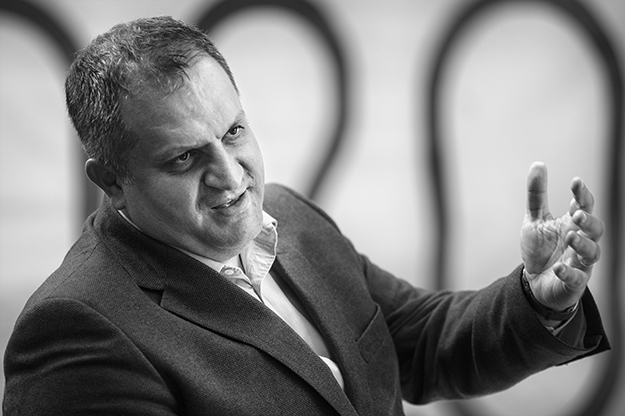
Photo: Majlinda Hoxha / K2.0.
There are many who have already criticized you for ‘wasting’ a lot of energy dealing with the past. How do you respond to that?
Dealing with the past is unavoidable. We cannot move forward if we do not deal with the past. In other words, I have to deal with nepotism in education, because if we want to suspend those people we must know what has happened. If we suspend someone but don’t tell them the reason behind it, they might say: ‘Look, he is doing it on partisan principles.’
We cannot go on employing nephews and nieces because someone is in the government. At the same time, we must be convinced that this mindset must belong to the past. We are working so that the citizens will change their approach towards the Municipality. The 46,000 illegal constructions were not carried out by only one man, it had turned into an acceptable standard. Everyone did what they wanted. Some had more money and paid, others were corrupted and an entirely criminal network was set up.
Polarization has been extreme during your term but, in hindsight, have your opponents ever been right when they criticized you?
We have had ongoing discussions in the Municipal Assembly. In the media you see only shouting and yelling, but there have also been sound discussions. There were discussions on budgets, financial reporting. I often agreed with the opposition when they raised certain issues. I am not opposed to differences because I too can make mistakes. When we put an end to illegal construction some applauded us, but others said we are leaving people without jobs. But this is over now. Now we are talking about legal construction, so we are moving forward.
So you are also justifying the radical measures taken in order to regulate the issue of illegal construction. What about issues like the lack of parking spaces, and installing posts alongside the sidewalks preventing parking and allowing people to walk freely? Do you justify radical measures even when you do not provide a prompt solution, as was the case with the lack of parking places?
Someone wrote to me some time ago saying “you can’t install posts because you didn’t find new parking lots.” So, ‘no posts, until you find a solution.’ But sidewalks are not meant for parking, regardless of whether there are parking lots. In other words, we can talk about the lack of parking places, but there is nothing to talk about with the sidewalks, and we must declare war on cars.
I believe I’ll lose votes with this, because people in Kosovo have a special relationship with their cars. They like to have their coffee and see their car while they drink it. We believe this should change and this does not change with just one policy. For example, I don’t agree with four lanes in the road at the entrance to the city.
So you don’t agree with the new project in Veternik?
I don’t agree, because four lanes will reduce to two lanes within the city and, when you make four lanes, you kind of tell the cars: ‘come in!’ I don’t think we should have policies inviting cars to come into the city.
You don’t think that this would help decongest the city?
No, because these cars will enter Prishtina again, and we have two lanes in the city, even one lane in some places. So, the amount of cars will be a problem. We want to substitute cars with buses, pedestrianized areas, and bicycles. But one politician has a limited capital. I cannot start 250 battles at once.
"Did we make mistakes? Of course, it is impossible without mistakes. Could have we done more? I believe that we can always do more."
Well, it is not as though we’ve seen many things being done for cyclists during your mandate.
Prishtina has an unsuitable terrain for cycling, but cyclists disagree with me. We are working on a mobility plan, supported by the European Bank for Reconstruction and Development (EBRD), which was actually linked with the loan for the buses. We have carried out a survey of 3,700 of Prishtina’s citizens and we are getting to know where people move during the day — is it from Dardania to Sunny Hill, or is it otherwise?
Once we get to know this, we will also redesign new bus lines, and there will also be a project for cyclists, and for pedestrians. For example, you may want to have a green pathway for pedestrians to walk along the city.
Does Prishtina have space for such projects?
Yes. Creativity is necessary, but it certainly does have space.
Because today we do not have much space for people with special needs, and citizens asked about this as part of our #IWantToKnow campaign.
We have identified those people individually, down to the apartment buildings where they live and are encountering problems to go out. We have built individual ramps at many entrances in Prishtina.
Do you know how many?
Well, there are many cases. We have constructed an elevator in the Municipal Assembly building. Before, a person with special needs in his wheelchair could never meet the mayor. We have installed an elevator in the Main Family Health Center in Prishtina, another elevator in the Family Health Center in the Sunny Hill neighborhood. Are there still barriers? Yes. But we are trying to lift those barriers over time.
"I don’t agree, because four lanes will reduce to two lanes within the city and, when you make four lanes, you kind of tell the cars: 'come in!'”
Is this city friendly or equal to all? I say no. But for the first time here, we have constructed a sidewalk for blind people in a small part of the city.
But apart from that part of the center, such routes are not to be found anywhere…
They should be everywhere, but this is what we are able to do. But it’s important to tell the citizens that we are working for equality, and this category of people is very important for us. Not everything is fixed with one elevator in the Municipal Assembly building, because we also need a proper toilet for people with special needs. But numerous needs require that we tackle each one at a time.
Out of 11 electoral promises, there is one which hasn’t even begun to be carried out – an affordable housing project, with municipal subsidies, for those who work in the public sector but cannot afford sustainable housing. Why has nothing been done towards this?
We have left it for the end; it is not a project that ends in a year after one term. We have already drafted some policies in this direction.
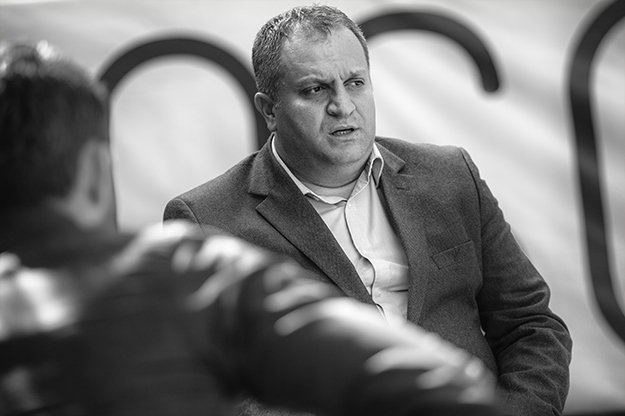
Photo: Majlinda Hoxha / K2.0.
What exactly has been done?
We believe that in May we will present this entire project. The idea is to use municipal land for construction in cooperation with the private sector in order to create a series of apartments. [It is] the apartments I mentioned during the electoral campaign; 40 to 60 sq. meters to be given to employees, under the condition that they dedicate part of their life to the public sector.
There are a lot of employees in the public sector in Prishtina. Do you think this is a well-thought out project?
We also have a lot of land, and not all those who work in the public sector in Prishtina need an apartment.
What if someone who works in the public sector and has his housing resolved, applies for such an apartment?
Well, there are priorities. So, we go with those who really need them, and it would be a continuous project, like the case of social apartments [that the Municipality has given to poor families]. I believe this was the best case ever to have been done for social assistance cases.
Did you have many complaints in this process?
Not many, because I told the commission: ‘Take as many observers as you need, and if I happen to say who should get an apartment, you can all resign. But also know that if I discover that you did something intentionally, know that I don’t know you and I will report you.’ We have concluded that 50 families benefited and 250 didn’t. From their perspective, everyone is in a bad situation, but in the end I believe they saw that the process was transparent.
"Politics for me is neither an exchange, a purchase, nor a personal or party interest, but rather the art of the possible — what you can achieve to improve the wellbeing of people."
Do you think you could have done things quicker?
I believe that we can always do more and should never be satisfied. But I didn’t even imagine that some things would turn out the way they did. We had a one-year delay with the signing of the deal for the buses. So, there have been things that took more time than needed.
For example, the reformation of public transport?
No, I think that it was a substantial change, and such changes do not happen overnight.
So when will public transportation be completely transformed?
Look. Vienna has among the best public transport systems [in the world], and they are still working. Reform should never stop. We end our mobility plan in June and by September we’ll get 21 additional buses, which we will place on other lines. In June we’ll know the new lines. We are preparing new seven-to-10-year contracts, with private investors who will invest in newer buses.
I believe that we’ll also have timetables soon, and I expect to have the largest part done by the end of the year. We’ve bought 51 buses, but we need 80 buses from the public sector, and 80 from the private sector — this is the agreement we’ve signed with the EBRD. But it must be said that these 51 buses have changed the image of our city, and there is less congestion too. Maybe people are not noticing it.
You think there is less congestion? How did you measure this?
We have carried out scientific analysis to find this out. People who did not use [public transport] are telling me that they are doing so now.
But isn’t this bus thing a bit exaggerated?
Well, it is kind of funny that [it is] 2017 and we are happy about new buses. It would be good if we would be happy for a tram or something else in 2017. But we cannot jump from the first to the 15th stair.
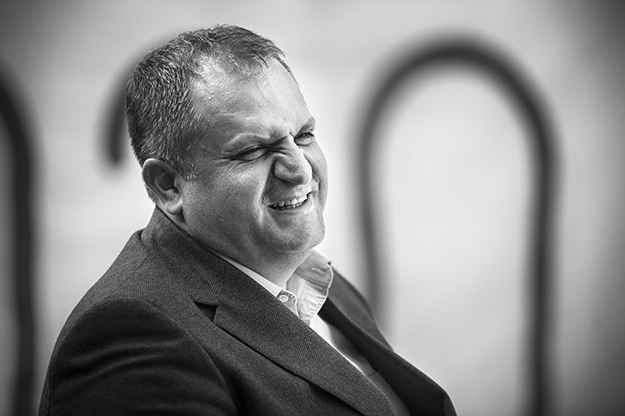
Foto: Majlinda Hoxha / K2.0.
We have put an end to the bad things, and we have started the good ones. We have improved social services, we have improved social equality in the city, we have started with kindergartens, water and buses. We are talking about basic services, about solving basic problems. Olympic pools, a concert hall — that is the second step of the development of Prishtina and the involvement of the private sector. After this, we have the development phase, which will happen in the next term with other projects.
Based on what you’re saying, it turns out that if you get another term, you’ll deal with the basic needs of Prishtina’s citizens?
We are putting an end to these basic problems. If we talk about water, public transport, kindergartens, we cannot say that we have finished everything but things have improved considerably. We have introduced order, we have digitized our services, our administration works much better. Now we are looking at another level.
"I want to protect the citizen with a house whose light is blocked by another citizen with a taller building."
If primary health care is the basic level that we improved, now we are looking at secondary health care. We’re looking at pools and other attractions. I want to see Prishtina as a liveable city, which attracts many tourists as well as those who want to come and live in Prishtina, and a municipality that provides quality services to its citizens. I think of Prishtina and how it should be in 2030 or 2040, when I won’t be [its mayor].
And how do you see Prishtina in that future?
From the chaos that we used to have, I see it with much more order, green space, well-planned spaces — even though considering this construction mess, we’ll have many consequences which we endure today as well. We cannot buy the 18-meter buses that Prishtina used to have during the ’80s due to construction that took place. There are consequences. But I lived in the U.S. for two years and a citizen there has to worry about his salary, and not about water to take a shower, a pool or a concert hall. Such are our problems.
Today we have a multiplex cinema. The Municipality did not make it, but the improvements in Prishtina made an investor come and think that there is place for investments here, a place much better than Skopje, or Tirana.
What did your governance do to attract these investors?
Well, perhaps you could ask those new world brands that are increasingly coming here, which was not the case before — political problems, insecurity, a completely different functioning of the administration. Now we are talking about order, construction and permits.
"I believe we can be defined as a social democratic government that fights and works for equality, that helps the private sector, with the public sector being of key importance."
When CinePlexx came here, from the moment I met them and convinced them that Prishtina is the city they should come to, I met them 10 more times and I helped them promote their cinema. For me, it was important to have a cinema with many screens.
Why should you help a private company when Prishtina already has a cinema?
Because I don’t want my citizens of Prishtina to go to Skopje for a movie. Now they have a nice and even better place in Prishtina. I don’t want my citizens to go to Skopje for a McDonalds or a Burger King. I want to make turnover here, to generate income here.
But isn’t this contrary to the social democratic concept when you promote a private company?
Social democracy, according to my belief, is that which believes in a capitalist system, and there are many ways. We do not allow the market to build where it wants and what it wants, but every social democrat wants to have a cinema in the city. They want to have a functional family health center, so that a citizen can fix a tooth for 4 euros and extract it for 1.50 euros, while in the private sector he pays 40, and 20 euros for those services. The citizens should be provided quality service.
Would you qualify your governance as socially-democratic?
I believe we can be defined as a social democratic government that fights and works for equality, that helps the private sector, with the public sector being of key importance. I know that some of the croissants [given out in schools] are thrown [in the garbage], maybe at Dardania school not all the children eat their croissants, but in poorer neighborhoods they do eat them. We will improve this system further in the years to come.
But for those who cannot afford it, we want to guarantee a minimum of croissants and milk. My daughter should understand when she returns from school why I am making croissants and milk [obligatory in schools]; she should understand that she has 35 classmates and there are some with better pens and bags, while others have none of those things. Then children at that age will understand that some values are all-encompassing and we should push them forward. We are installing a mentality which believes that you cannot teach multiplication tables to a second grade pupil while he is hungry.
I want to protect the citizen with a house whose light is blocked by another citizen with a taller building. That is the one I want to protect, and tell him, ‘you have rights too, it is not all about money.’
After Vetevendosje MP Albin Kurti spoke out against the Devolli Company and its ties with politics, many saw that speech as being directed against you. Others commented that Mr. Kurti wanted to point out that Vetevendosje is not captured by an oligarchic system, after the photos of you on a yacht with Blerim Devolli came out. Is there a clash between you and Kurti?
First of all, Vetevendosje cannot be captured by a big company. I believe that we are developed and mature enough, and that we owe nobody, neither myself as an individual, nor Vetevendosje. Our fight for workers’ rights and against oligarchy is a known fact and it is in our party’s program, which I also contributed to the writing of.
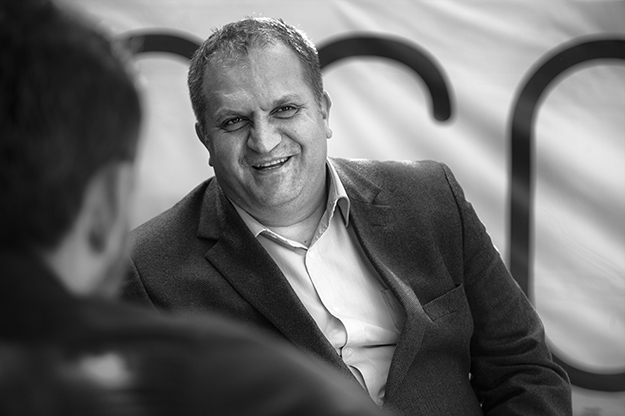
Photo: Majlinda Hoxha / K2.0.
I was the key person that pushed forward the investigation into AXOS and PTK’s agreements [after AXOS acquired 75 percent of shares in the telecommunications company], and into the Ibrahim Rugova Highway [and the Kosovo government’s failure to publish the contract for its construction], and many other things. That speech, about bad guys and good guys, wasn’t directed at me or at any other individual in Vetevendosje. It was rather a reaffirmation of what we have been continuously saying as Vetevendosje.
What caused that speech? Was it accidental?
That speech was prepared on March 2, days before the attack against me with those photos. So, it was thought of as a reconfirmation that Vetevendosje protects different groups of people. For example, we have farmers telling us that we are buying their milk very cheaply, or supermarket workers who work six days a week. Vetevendosje will protect those people by all means, by attacking all big companies, and it is clear that we are in favor of workers’ rights.
But there are also those who see that as part of a competition between you and Mr. Kurti. What is your opinion on that?
Competition over what?
To become Vetevendosje candidate for prime minister.
I have pointed this out in the past, and I say this today: I am interested in continuing my work in Prishtina. But I have also said there is no taboo topic in Vetevendosje. Currently, I do not have such ambitions.
I believe that the second mandate will be easier in terms of the work to be done in Prishtina, and it will be more dynamic because I believe there will be another constellation of powers. I also believe there are people who have been more engaged on a central level, such as Albin and others, and we are mature enough to have this discussion within Vetevendosje.
A few days ago, you said you disagree with part of Kurti’s speech, when he talked about big enterprise, and the economy in general…
Do I agree 100 percent with all members? No way. When we voted for the party’s program, we agreed on its content. That program covers small and medium enterprises, but also big ones and the role of the state. In other words, if we find oligarchy or monopoly anywhere, we’ll put an end to it. No doubt about it.K
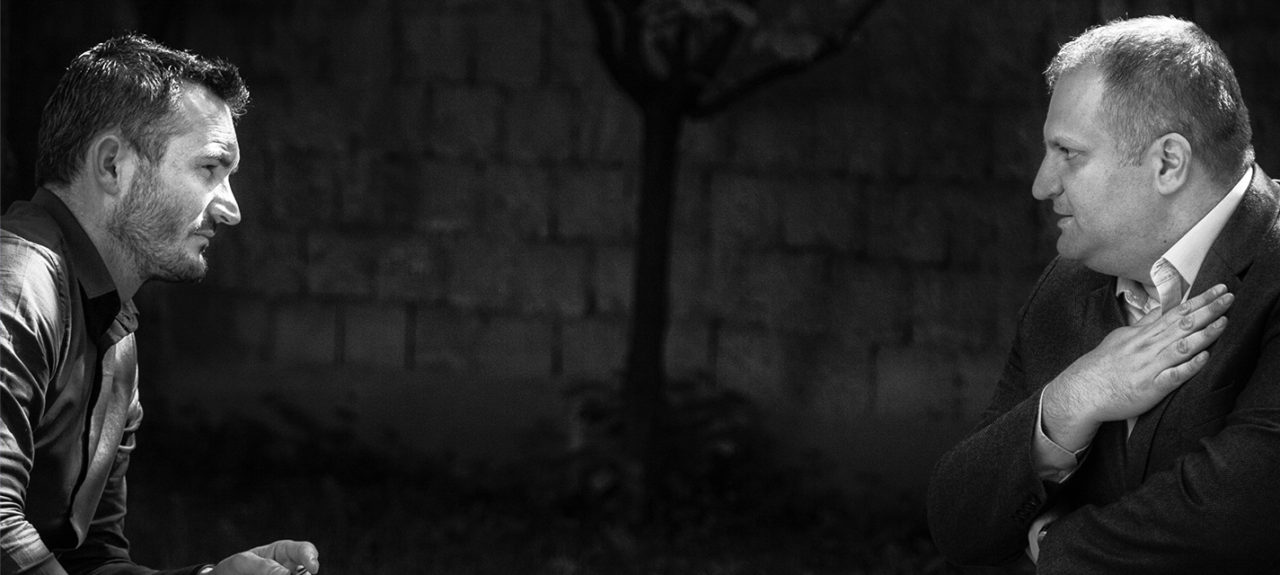
Photo: Majlinda Hoxha / K2.0.
Feature image: Atdhe Mulla / K2.0.
This conversation has been edited for length and clarity. The interview was conducted in Albanian and includes questions raised by readers during our #IWantToKnow campaign. The #IWantToKnow campaign has been supported by the Embassy of the Netherlands in Kosovo.







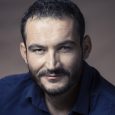
Great interview, thanks!!! Especially that it is an interview based on knowledge by the journalist and with critical questions, love this!!!